|
The Greatest Tearjerkers of All-Time
|
|
Title Screen
|
Movie Title/Year and Brief Tearjerker Scene Description |
Screenshots
|

|
Umberto D. (1952, It.)
 #39 #39
- the melodramatic plight of government pensioner
Umberto Domenico Ferrari (Carlo Battisti), whose slashed monthly
pension eventually caused his heartless city of Rome landlady Antonia
Belloni (Lina Gennari) to evict him and rent out his cheap furnished
room to prostitutes and their johns
- the close-knit, dependent relationship
between Umberto and his faithful spotted terrier Flike and his touching
lone friendship with caring young pregnant kitchen maid Maria (Maria-Pia
Casilio) of the boarding house
- the
tearjerking, ambiguous ending in which Umberto D., unable to give
away his dog (or raise money by selling his books and watch), contemplated
suicide by stepping in front of a speeding train near a park while
holding Flike in his arms -- the dog yelped, and squirmed away
before Umberto could step in front of the train, and for the first
time ran away in abject fear from his beloved master
- after
he finally coaxed Flike back to him by having the dog perform tricks
with a pine cone ("Flike, look at the pinecone. Come on, here, boy.
Come on, stand up"), he played with the dog (trained to stand on
its hind legs) in a long shot as the film ended, despite having
no place to stay and no income
|




|

|
An Unmarried Woman (1978)
- the scene of the protagonist couple walking through
the streets of NYC's Soho, when unhappy stockbroker husband Martin
Benton (Michael Murphy) suddenly began sobbing in front of his
wife Erica (Jill Clayburgh). She asked: "Marty, Marty, come
on, what is it, honey? What's the matter? What is this? What, tell
me?" - he delivered a tearful admission about his year-long
affair with another woman whom he met at Bloomingdale's: ("I'm
in love with somebody else. I'm seeing another woman, for over
a year. At first, you know, I thought it was just a-a fling. But
it isn't. I love her. I want to live with her. Oh God, I don't
want to hurt you. I don't
want to hurt Patti. But I-I can't...She's not a whore or anything.
Her name's
Marcia Brenner. She's, she's
a teacher. She's twenty-six. I met her at Bloomingdale's,
for Christ's
sake. I was standin' there buying a shirt, you know, and she-she
was standing next to me. She asked me if I liked this shirt that,
uh, that she was buying for her father. Oh, God! I'm so sorry")
- and Erica's first stunned words: "You
tell Patti, you tell Patti that you're sorry." Martin repeated:
"I'm in love with her." Erica asked a stony question: "She
a good lay?" and then fled down the street and soon vomited
- the scene in which Erica began to 'erase' Martin's
memory by removing his belongings and piling them into the
living room, and also removing her gold-band wedding ring from her
finger
|



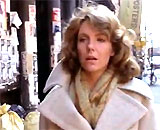


|

|
Up (2009)
- the emotionally deep, powerful
and effective wordless 4-minute montage of 'married life' -- a
man's entire relationship with his wife up until her death - in
the person of two young kids who met and later married: balloon
salesman Carl Fredricksen (voice of Ed Asner) who worked in a zoo
and adventurous, tomboyish Ellie (voice of Elie Docter)
- their lives were a journey
of growing old, including buying and fixing up a dilapidated two-story
home (soon threatened by encroaching city developers), painting
their names (and leaving handprints) on their mailbox, taking frequent
picnics to a hillside where they laid on their backs and observed
cloud animal shapes, dreaming of having a family and setting up
a nursery room but experiencing childlessness (miscarriage), his
presentation of "My
Adventure Book" to her with their mutual dream of going to Venezuela's
Paradise Falls by saving spare coins for the journey (but they were
never able to go, due to other obligations and debts), her tying
of his necktie (numerous times to indicate the passage of time) as
their hair greyed, his purchasing of tickets to Venezuela but the
abrupt interruption of her failing health and death, and his expression
of bereavement at her funeral before returning home alone - as the
montage ended
|



|

|
Walkabout (1971, UK/Australia)
- the stunning mating dance (in his own tribal
fashion) that the native aborigine boy (David Gulpilil) performed
during his 'walkabout' for the civilized teenage girl
(Jenny Agutter) - but that she ignored - with disastrous results
when he committed suicide by hanging himself. However, she barely
reacted to his death
|


|

|
WALL-E (2008)
- the final scene of Pixar's and Disney's animated
science-fiction film - an odd-couple love story
- a crushed and 'dead'
WALL-E (short for Waste Allocation Load Lifter Earth-class) (voice
of Ben Burtt), the last lone garbage-compacting robot on Earth,
was rebuilt by EVE (short for Extra-terrestrial Vegetation Evaluator)
(voice of Elissa Knight), a sleek, white-shelled probe droid-robot,
who used WALL-E's own spare parts collection to reconstruct him,
but he appeared to have lost his acquired sentience, personality
and memories
- she attempted to stir his memory by placing a lightbulb
and Rubik's Cube in his grasp and by playing his favorite Hello,
Dolly! tape recording - with no luck. He turned and began
his robotic task of trash-compacting. She tried to shake some sense
into him, but it still didn't jog his memory - he stared back blankly.
- but then he remembered who she was after they clapsed
'hands' and she caused a small spark to occur when she touched
his forehead - he came to life, focused his eyes on her, and they
enjoyed a second longer kiss together
|




|

|
Waterloo Bridge (1940)
- the scene of impoverished
ballerina/prostitute Myra Lester's (Vivien Leigh) tragic end as
she walked into oncoming traffic on Waterloo Bridge
- Capt.
Roy Cronin's (Robert Taylor) flashbacked memory years later on the
bridge of her words in the film's final melodramatic moments: ("I
loved you...I've never loved anyone else...I never shall"),
as the singing of "Auld Lang Syne" rose on
the soundtrack and he fingered her good-luck charm
|
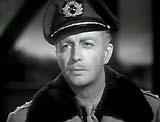
|

|
Watership Down (1978)
 #15 #15
- the "Bright Eyes" sequence
in which Fiver (voice of Richard Briers) found out that Hazel (voice
of John Hurt) had been badly wounded by a shotgun during the farm
raid, and Fiver's chase with the ghostly Black Rabbit (voice of
Joss Ackland) to reach Hazel before the angel of death could claim
him, as Art Garfunkel's melancholy song about death was played:
("Bright
eyes, burning like fire. Bright eyes, how can you close and fail?
How can the light that burned so brightly suddenly burn so pale?
Bright eyes")
-
the touching final scene in which the Black Rabbit appeared to an
aged Hazel, requesting: ("I've come to ask if you would like
to join my Owsla [police force]. We shall be glad to have you, and
I know you'd like it. You've been feeling tired, haven't you? If
you're ready, we might go along now")
- the Black Rabbit reassured Hazel as he looked
back at the young rabbits cavorting in the warren, that they would
be safe and all their offspring: ("You
needn't worry about them. They'll be alright, and thousands like
them. If you come along, I'll show you what I mean")
-- followed by Hazel's quiet death when his spirit rose from his dead
body and joined the Black Rabbit's
|




|

|
Way Down
East (1920)
- the spiritually affecting, melodramatic performance
of Lillian Gish as Anna Moore
- the scene of the young,
innocent country girl's ecstatic reaction to a marriage proposal,
soon followed by the scene in which her playboy "husband" Lennox
Sanderson (Lowell Sherman) revealed that her marriage was only a
mock ceremony
- the sequence in which Anna baptized her sick, newborn
baby just before it died in her arms
- the innocent love scene
on the grass next to the river between Anna and David (Richard Barthelmess)
- with the title card: ("One heart for one heart, One soul for
one soul, One love for one love, Even through Eternity") - but
Anna was reluctant to fall in love with David when reminded of the
ghosts of her past - she sadly could not allow him to say such things,
feeling unworthy of him due to her checkered past: ("So she
tells him he must never speak like this again")
- the classic
casting-out scene in which she accused and denounced Sanderson before
entering into a fierce blizzard
- the final sequence of her daring,
last-minute rescue by David from floating ice floes that were perilously
close to a precipitous waterfall
|


|

|
The Way We Were (1973)
 #28 #28
 #64 #64
- the on-and-off, star-crossed romance-marriage-divorce
between two radical opposites: Jewish political activist Kate Morosky
(Barbra Streisand) and WASP writer Hubbell Gardner (Robert Redford),
spanning from the 30s, through World War II to the McCarthy-era 1950's
- the tearjerking final scene in which they met
accidentially in New York as she was handing out "Ban the
Bomb" leaflets,
to the strains of Streisand's performance of the title song: (Oscar-winning
music from Marvin Hamlisch - "Mem’ries, Like the Corners
of my Mind / Misty Water-Colored Memories of The Way We Were"),
when she characteristically brushed the hair back on his brow
|


|
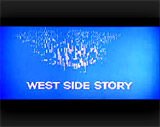
|
West Side Story (1961)
 #31
#31
- the modern, musical updating
of William Shakespeare's Romeo & Juliet
- the
poignant, powerful duet of "Somewhere"
between star-crossed lovers: Caucasian Tony (Richard Beymer) and Puerto
Rican Maria (Natalie Wood)
- the tragic death scene of Tony, with a grieving
Maria's anguished ranting at gang members - accusing all of them
for being responsible for Tony's senseless death, and lecturing them
at how hate breeds more hate: ("...You all killed him!...Not
with bullets and guns! With HATE! Well, I can kill too, because now
I have hate!")
- the scene of Maria's touching
farewell to Tony, as she fell to her knees, weeping, and tenderly
kissed the lips of Tony one last time and expressed her love for
him in Spanish, with: ("Te
adoro, Anton"). The two
gangs, confused, stunned, ashamed and sobered by the unnecessary triple
killings, finally put aside their enmity. As some of the Jets struggled
to bear Tony's body away, a few of the Sharks assisted them. Together,
they solemnly carried him down the street, with Maria following
|



|

|
Whale Rider (2002, NZ)
 #66
#66
- the scene in which young Maori girl
Paikea (Keisha Castle-Hughes) gave her award-winning speech in school about
her ancestors, crying profusely as she delivered it because her grandfather
and Maori chief Koro (Rawiri Paratene) didn't show up
- the mass beaching
of whales and the desperate attempts by the Maori to keep them alive
- and the mystical scene in which Paikea literally
rode the back of the largest whale out to sea, having restored its
will to live so it could unbeach itself: ("I wasn't afraid to die")
- the scene of Koro's acceptance of Paikea as
a new Maori chief as she lay unconscious in a hospital bed
- the
final shot of grandfather and granddaughter together at sea on the
Maori long canoe, as she led the chant while wearing Koro's whale
tooth necklace
|



|

|
What Dreams May Come (1998)
- the tragic early scene in which
pediatrician Dr. Chris Nielsen (Robin Williams) lost his two children
Marie (Jessica Brooks Grant) and Ian (Josh Paddock) in an off-screen
car crash, with his melancholy narration: ("It was the last
time Annie and I saw them alive") -- and the shot of his son
Ian inside his coffin
- and then four years
later, the scene in which Chris, now also deceased and in the afterlife
but lingering on Earth - after another multi-car crash in a tunnel
- attended his own funeral and comforted his still-living wife Annie
(Annabella Sciorra)
- Chris' attempts to force despondent
Annie to acknowledge his continued existence (after whispering in
her ear: "This
is Chris. I still exist," he made her scrawl the words: "ISTILEXST"
in her diary, and
then later tried to contact her at his gravesite: "Don't worry,
baby, I'm not leaving you alone. I'm not goin' anywhere") --
and her violent sobbing reactions, forcing Chris to reluctantly leave
her and Earth and journey to the afterworld to prevent any more harm:
("The reality is it's over when you stop wanting to hurt her")
- also, the scene of despairing Annie committing suicide,
foreshadowed by the death of her purple-flowered tree in the 'heavenly'
painting, and her journey to Hell: ("You never see her. She's
a suicide. Suicides go somewhere else...The real Hell
is your life gone wrong")
- Chris' sentimental apology
to Annie in Hell for all the things he couldn't give her: ("I'll
never buy you another meatball sub with extra sauce -- that was a
big one! I'll never make you smile...")
- and the tearjerking
'feel-good' Hollywood finale that reunited wife Annie with him and
their two dead children in the heavenly afterlife: ("Travel here
is like everything else, it's in your mind. All you have to do is
close your eyes if you know where you're going. Looks like we did").
After she vowed to Chris:
("I want us to grow old together. Can we do that here? I want
it all. As long as it's with you"), they experienced a spiritual
reawakening in the bodies of two young children by a lake: ("When
I was young, I met this beautiful girl by a lake")
|






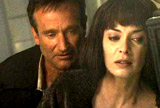

|
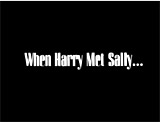
|
When Harry Met Sally... (1989)
- the crowd-pleasing, tearjerking finale
featuring Sally Albright's (Meg Ryan) moving mixture of frustration, longing,
loving, wariness and desperation after Harry Burns (Billy Crystal) had professed
his at-long-last love for her at a New Year's Eve party: ("You see.
That is just like you, Harry. You say things like that, and you make it
impossible for me to hate you, and I hate you, Harry. I really hate you.
I hate you")
- there were passionate kisses as they
finally conquered their doubts over the budding romance born of an
initially platonic friendship years earlier
|
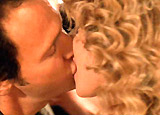

|

|
White Christmas (1954)
- the Irving Berlin tribute songs,
in the holiday show, to respected, popular and now-retired Major General
Thomas F. Waverly (Dean Jagger) - a Vermont innkeeper, sung by his former
soldiers: "What Can You Do With a General?" and "Geee!
I Wish I Was Back in the Army"
|


|
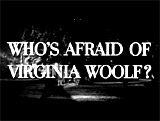
|
 Who's Afraid of Virginia Woolf? (1966)
Who's Afraid of Virginia Woolf? (1966)
- Martha's (Elizabeth Taylor) anguished
reaction to the "death" of her fictional son ("NOOOOOOoooooooo!")
and her plaintive, accusatory words to husband George (Richard Burton):
("There
was no need. There was no need for this!...You didn't have to kill him!")
- the long, monosyllabic exchange between the two
after their late-night guests Nick (George Segal) and Honey (Sandy
Dennis) left their company: (..."It was time." "Was it?" "Yes."
"I'm cold." "It's late."...)
- in the closing of the film, Martha's admission
when George sang "Who's afraid of Virginia Woolf?" -- "I
am, George...I am"
|


|
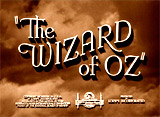
|
 The Wizard of Oz (1939)
The Wizard of Oz (1939)
 #35 #35
- Kansas farm-girl Dorothy Gale's (Judy Garland) bidding
of farewell to all of her newfound friends in the Land of Oz: especially
her sad goodbyes with the Tin Woodsman (Jack Haley): ("Now I
know I've got a heart, because it's breaking") and with the
Scarecrow (Ray Bolger) - highlighted by her final hugs and kisses
reserved for him and her whispered sentiment:
("I think I'll miss you most of all")
|

|
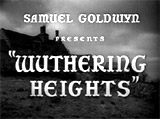
|
 Wuthering Heights (1939)
Wuthering Heights (1939)
- the Gothic doomed romance between
passionate and headstrong Cathy Linton (Merle Oberon) and brooding Heathcliff
(Laurence Olivier)
- the tragically romantic death scene in Cathy's bedroom
as Heathcliff was reunited with her and carried her to the window
for one last look at the moors in the distance
before she died in his arms: ("Take me to
the window. Let me look at the moors with you once more, my darling.
Once more...")
- the final image of the ghosts of Cathy
and Heathcliff walking on Peniston Crag in the moorlands
|



|





































































